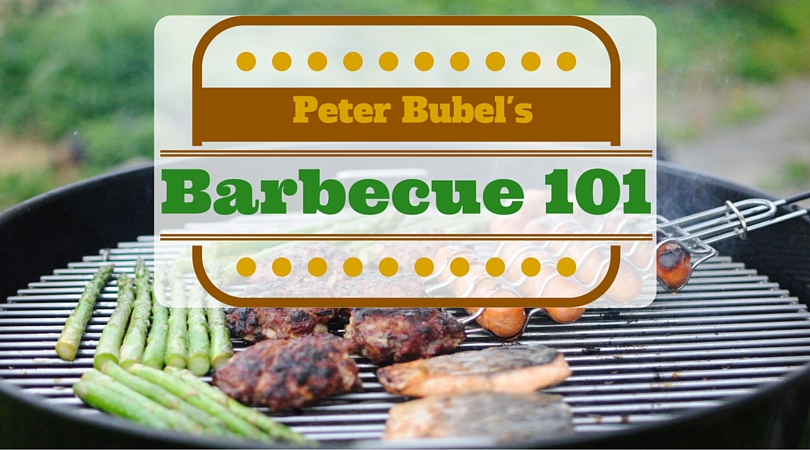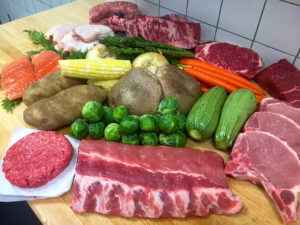To view this post as a video, please visit Peter Bubel’s YouTube Channel.
It’s summertime. Birds are chirping, flowers are in full bloom, and the air is laced with the sweet, smoky smell of barbecue. It’s enough to make anyone want to break out their grill and get cooking. Before you dig out those tongs and charcoal, though, take a look at these barbecue tips and tricks for the tastiest, juiciest, healthiest meat on the market.
-
Everything that touches raw meat should be washed. Whether it’s your hands, your plates or the silverware you use to put it on the grill, everything that touches raw meat needs to be washed to prevent the spread of bacteria.
- Don’t let your raw meat sit out. Raw meat that sits at room temperature for more than an hour is highly susceptible to bacterial growth, and the longer is sits, the more exponential the growth becomes. If your meat is frozen, thaw it out overnight/all day in the refrigerator.
- Wipe down your grill. Defend your grill from sticky food like lean meats and fish by wiping down the grates with paper towels dipped in cooking oil prior to grilling, the same way you would if you were cooking in your stove.
- Use acidic marinades. Whenever possible, use acidic-based marinades (vinegar, citrus juice, and beer are all good bases) to protect your meat – and yourself – from heterocyclic amines, carcinogens that are most often caused by cooking meat over an open flame. The same goes for poultry and fish. Avoid “flame-kissing” and burning your food on a grill to reduce your risk of consumption.
- Barbecue sauce is not a marinade. Because of the high amount of sugar found in barbecue and other tomato-based sauces, leaving them on the grill for too long will result in blackened, burned meat that is stuck to your grill and full of harmful carcinogens. To avoid this, only apply these sauces in the last few minutes of cooking. The same goes for salt. If you salt your meat too early, the salt will draw moisture from your food and leave you with some tough and dry barbecue.
- Light your fire early. If you’re grilling with charcoal, don’t throw your food on the grill and then fire it up. Light the coals about 20-30 minutes prior to cooking to let the grill reach a nice, even temperature. Think of it like preheating your oven before you use it to cook. If you use lighter fluid to start the fire, make sure the fire is out and the briquets are coated in ash before you add your food or it’ll come out with a gross taste of lighter fluid. If you’re using a smoker, light the charcoal with a chimney started to eliminate the worry of lighter fluid flames.
- “If you’re looking, it ain’t cooking.” As tempting as it is to check on your food every five seconds in anticipation, the more you fiddle with your food while it cooks the less likely it is to be cooked evenly. This is especially true for those using a smoker. If you keep opening it, the smoker will drop below the necessary temperature and your food will not be cooked properly.
-
Grill your veggies, too. If you want to pair some ears of corn or potatoes with your grilled meat, you can wrap them in aluminum foil and throw them on the grill as well. Cover them in butter, sprinkle on some salt, make sure they’re wrapped completely and tightly in foil, and toss them on the grate.
- It’s better to be under than over. If you can’t remember how long your food has been cooking and you think it might be done, take it off the grill. You can always grill the food for longer if it’s not done, but you can’t un-cook overcooked food.
- Steaks can be rare, burgers shouldn’t. Most bacteria is aerobic. Steaks are fine to eat raw as long as the outside is cooked since no bacteria can grow inside of the meat. However, since hamburger is all ground together, most of the surface at some point touches the air, greatly increasing the risk for bacterial growth. To be safe, make sure the internal temperature of your burger reaches 160 degrees.
- Your meat does not need to rest before you eat it. One of the greatest myths in grilling is that meat needs to rest to allow the juices to redistribute. If you let your food sit, especially if you rest it under foil, will make your food colder and even sometimes mushier. High-end steakhouses serve their steaks right off the heat for a reason, and so should you.
Grilling undoubtedly requires a lot of trial and error until you finally master it. Everyone has their own tips, tricks, and secrets to becoming a grillmaster. As long as you practice safety with your grilling, there’s no reason that you yourself can’t become a grillmaster someday, too.



